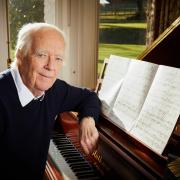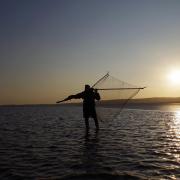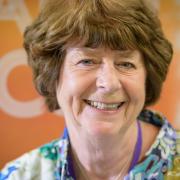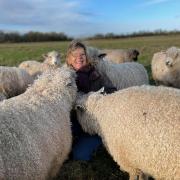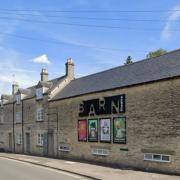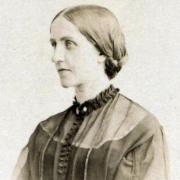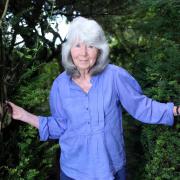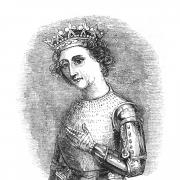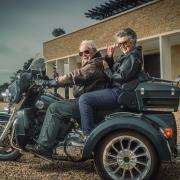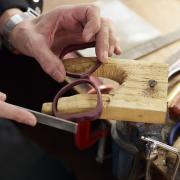Gloucestershire's new Police and Crime Commissioner tells Katie Jarvis about his
Cotswold Life – and his home-made Lobster Thermidor! Pictures by Antony Thompson
When constabulary duties have been done, have been done...
Gloucestershire’s new Police and Crime Commissioner tells Katie Jarvis about his Cotswold Life – and his home-made Lobster Thermidor! Pictures by Antony Thompson
As Gloucestershire’s first-ever police and crime commissioner, Martin Surl is aiming to be a force for good. And he certainly has the credentials – not only did he serve in the police for more than 30 years, both at home and abroad, but he’s also Gloucestershire born and bred.
He’s pledged to be a new voice for policing, who will speak up for victims and bring together all areas of the criminal justice system, as well as to involve schools and colleges.
“At the end of the day, I’d just like people to say that I’d helped make Gloucestershire a more peaceful place to live,” he says. Married to Elizabeth, with two grown-up children – Oliver and Joanna – Martin is a confessed ‘newsaholic’, whose other interests include Formula 1 and walking with his dog, Dominic.
Where do you live and why?
I live in Birdlip, a really nice village where almost everybody knows everyone else - though we only see each other in summer because it’s too dark and cold in winter! At more than 900 feet up, it’s the second highest village in Gloucestershire, with its own microclimate. I think, at times, I was the only person in the constabulary to be snowed in. I live in the old village police station, which we bought at auction in 1993. The pull, though, wasn’t the connection – I was desperate to make it not look like a police station! It was the fact that it was in the countryside, with a big garden. Both our children went to the village school, which was a lovely start in life.
How long have you lived in the Cotswolds?
I was born in St Paul’s Hospital, Cheltenham, and went to Dunalley Primary, before moving on to King’s in Gloucester. After school, I joined Royal Caribbean as a waiter on their first-ever cruise ship – Song of Norway – and spent a couple of years seeing the world. It was great fun – unbelievably hard work – and the experiences I had ultimately helped to make me a better police officer. I saw appalling poverty in Haiti, a fair bit of crime in Venezuela, and experienced racism as a ‘posh’ white guy in Jamaica. I learned to stand on my own two feet, and I began to understand different cultures. It was also a chance to do a bit of rebelling before I came back home and joined Gloucestershire police, at the age of 23.
What’s your idea of a perfect weekend in the Cotswolds?
It would involve people and good food, and it would have to be at harvest time. There’s a glow to autumn: the evenings are long; the temperature is just right; and the smell of freshly-cut wheat evokes the happy days of childhood.
If money were no object, where would you live in the Cotswolds?
I’d stay where I am because this is a fantastic community, but I’d buy enough land to have a village green and a duck pond.
Where are you least likely to live in the Cotswolds?
There are no specific areas but anywhere where people feel intimidated and unsafe. When you’re a young officer, everything seems black and white: these are the goodies; these are the baddies, and my job was to lock the baddies up. But, as I got into my career, I began to realise that life is extremely complicated. There are few seriously evil people in the world and, often, the ‘villains’ are the ones who’ve been dealt a bad hand. There are so many organisations – the police being one of them – who can deal them better cards; who can help them onto a better path.
Where’s the best pub in the area?
The best one I’ve been to recently is the Woolpack [at Slad]. Good pubs aren’t just about the beer; it’s the people and the service that make the difference. In the Sweeney days, when I was a young officer, we were expected to work the pubs. We even got beer money! It was all about being the local detective; about making sure there weren’t any no-go areas.
And the best place to eat?
At home. I’m not being big-headed – I just really enjoy being busy in the kitchen. Anybody can cook a steak or a vegetable or a sauce; the skill involves making sure it all arrives, hot, at the same time, and choosing the right wine to go with it. The first meal I ever made for my wife was Lobster Thermidor… but I think the second was egg and chips!
Have you a favourite tearoom?
I would love time to have tea but I could fill my diary four times over, as it is. I try to start my working day with a swim at the Chase Hotel [Cheltenham], which gives me time to think. Then it’s back-to-back meetings. There’s no job description for police commissioner, though there are some things you have to do, such as appoint the chief constable, set the budget and write a plan for policing in the county. I lived in Estonia for a while, where I worked closely with several British ambassadors, and I liked their style. They don’t do a 9-5 job: they represent the UK; they live the life – the dirty bits and the high life that goes with it. I’d like to try to represent people and policing in the same way.
What’s the best thing about the Cotswolds?
Forest, valleys, hills, tremendous architecture.
... and the worst?
Fly-tipping. The psychology of a person who makes the effort to dump rubbish in the countryside that they could take to the tip is beyond me.
Which shop could you not live without?
I’m not a big shopper but there is food I couldn’t live without. I have a passion for Stilton – so much so that I sometimes crave it – and I rather like jelly babies, too.
What’s the most underrated thing about the Cotswolds?
It is a safe place to live.
What is a person from the Cotswolds called?
Johnny Coppin [the singer-songwriter] referred to them as a breed of sturdy men.
What would be a three-course Cotswold meal?
I’d make a good paté for starters; then Gloucester Old Spot sausage with creamy mashed potato and, to finish, there’s got to be apple pie from one of the county’s orchards – all washed down with some Three Choirs wine.
What’s your favourite view in the Cotswolds?
Johnny Coppin, again, wrote a beautiful description of Birdlip – This night the stars like jewels shine, high over Birdlip Hill – and that’s exactly what it looks like if you stand at the Peak at Birdlip. I don’t mean the car park everyone uses; I’m talking about the little-known viewpoint along the Cotswold Way.
What’s your quintessential Cotswolds village and why?
I suppose it’s got to be the chocolate-box Slaughters. They’ve got everything.
Name three basic elements of the Cotswolds
Forest, vale, high blue hill.
What’s your favourite Cotswolds building and why?
There are so many, but the cathedral is amazing. And the best part is the cloisters, which are always so peaceful. When I worked at Gloucester police station, which (as Prince Charles would agree) is one of the ugliest buildings there is, I used to walk round the cloisters and, occasionally, do a bit of praying there. It’s a place where I can feel quiet. In the same way, there is an absolute connection between the environment and criminality. Probably one of the most effective methods of reducing crime is to design the environment we live in in a way that dissuades people from committing crimes. We need to plan our towns with a 24-hour clock in mind. So, for example, take Imperial Gardens in Cheltenham: at eight in the morning, you have people walking to work; at lunch time, it may be families having picnics; in the early evenings, you might find people on their way to wine bars. But by nighttime, it becomes more spooky and, potentially, a fearful place. I will be working with local authorities and residents, as well as the police, to understand how places operate at different times of the day and night.
What would you never do in the Cotswolds?
Stereotype people. In Gloucestershire, there’s such a broad range, from eminent people who own huge houses, to those who are very poor, and others who’ve barely left their village in their entire lives. As a police officer, you could go to one job where you’d be bumping into a lord or a lady, while the next might be somewhere deprived. But everyone is equal in the eyes of God and in the eyes of the law.
Starter homes or executive properties?
I’d like to see more people living in towns, above the shops, bringing them back to life and, thereby, making them safer, as well.
What are the four corners of the Cotswolds?
Sharpness Docks, which most people don’t know exist, Stow-on-the-Wold, Cheltenham, Fairford.
If you lived abroad, what would you take to remind you of the Cotswolds?
I’d take photographs of some of the walks we do. That’s the sort of thing we took to Estonia, where we lived for two years [when Martin was seconded to the Ministry of Justice to help modernise its police service]. Estonia is so flat; I missed the twists and the turns of the Cotswold countryside, and the changing of the seasons.
What’s the first piece of advice you’d give to somebody new to the Cotswolds?
Explore.
Have you a favourite Cotswolds walk?
Yes, but it’s a secret! It’s just off the Cotswold Way, and my dog, Dominic, discovered it first. It’s really special but only known to me, my children and my wife.
Which event, or activity, best sums up the Cotswolds?
Cheltenham Races sum up the hospitality of the Cotswolds. It’s open house in Gloucestershire. Everyone’s delighted to welcome thousands of visitors, and there’s hardly ever any trouble.
If you were invisible for a day, where would you go and what would you do?
I don’t see invisibility as a good thing, for two reasons. Firstly, it’s so easy to snoop on people nowadays with hidden cameras and bugs, yet one of the most important things you can do is to value the privacy of others. And, secondly, you can be invisible in a very busy place, and that simply equates to loneliness.
The Cotswolds - aspic or asphalt?
I’d compare this question to policing. The core values, which Robert Peel Announced in 1829, still hold good, but that doesn’t mean to say we should implement them in the same way.
What attitude best sums up the Cotswolds?
Reasonable. You can reason with local people, and they’re reasonable back to you.
With whom would you most like to have a cider?
My son, Oli, is in Australia. I’d love half an hour with him – we’d go for a beer.
For more on Martin and his role as Gloucestershire Police Commissioner, visit www.policecommissioner.net




